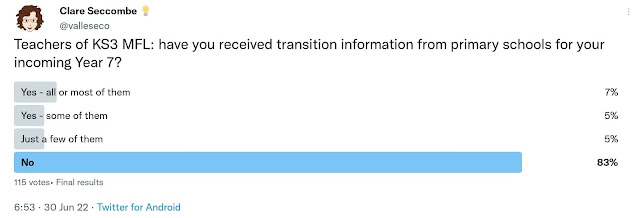Some points for consideration and action:
- The government has made it clear that they want the vast majority of Y11s to achieve the EBacc, which includes a language. If you want them to continue into KS4, you have to hit the ground running with them in KS3. Knowing what they did in KS2 is a crucial part of this.
- I hear every year of former Year 6 students, many of them gifted linguists, who have gone into KS3 and who are bored and switched off by their language learning, so much so that they seriously consider not opting for KS4. They don't feel they are learning anything different or new. I had one tell me about a basic homework that he had to do on me gusta in Year 7. He crossly told his teacher that he had already covered opinions in more detail in Year 3 and upwards.
- Many secondary teachers say "But we have so many feeder schools!" as a justification for starting from scratch with all Year 7s. I appreciate that this does create a significant headache, but we have to be inclusive, we have to consider all students in the class. This is the time to present usual language in an unusual way. I once wrote a transition unit for OUP where je m'appelle, j'habite and some basic description were covered using endangered species and their habitats. Mature and different contexts that students will not have covered in KS2 are the way to go. Even if they are using familiar language, make them feel like they are learning something new.
- Every year I send transition information to all the secondary schools my Year 6s are going to. I have done this for 13 years now. No secondary school has ever asked for it, and I have very little idea if (a) the managers of the secondary school email addresses pass it on to the MFL subject leaders, (b) what the subject leaders do with the information and (c) if this is the sort of information they would like to receive. But I continue to send it regardless, as I want to do right by my students and give them the best opportunity I can. For the last couple of years I have used the ASCL Transition Toolkit.
- Primary senior leaders: Make sorting out transition communications part of the job description of your Languages Co-ordinator.
- Secondary subject leaders: Consider giving the responsibility for contacting feeder primaries to a junior member of your department. They might have more time to get it done, and would like to have a role in the department.
- Primary colleagues: Most of us have two weeks of the school year left. Fill in the right-hand column of the ASCL Transition Toolkit and email it to the secondary schools that your Year 6s are going to, for the attention of the MFL Subject Leader.
- Secondary colleagues: Most of us have two weeks of the school year left. Send the ASCL Transition Toolkit to your feeder primaries for the attention of the KS2 Languages co-ordinator, and ask them to complete the right-hand column for their school and return it to you.



